Performance Management Training
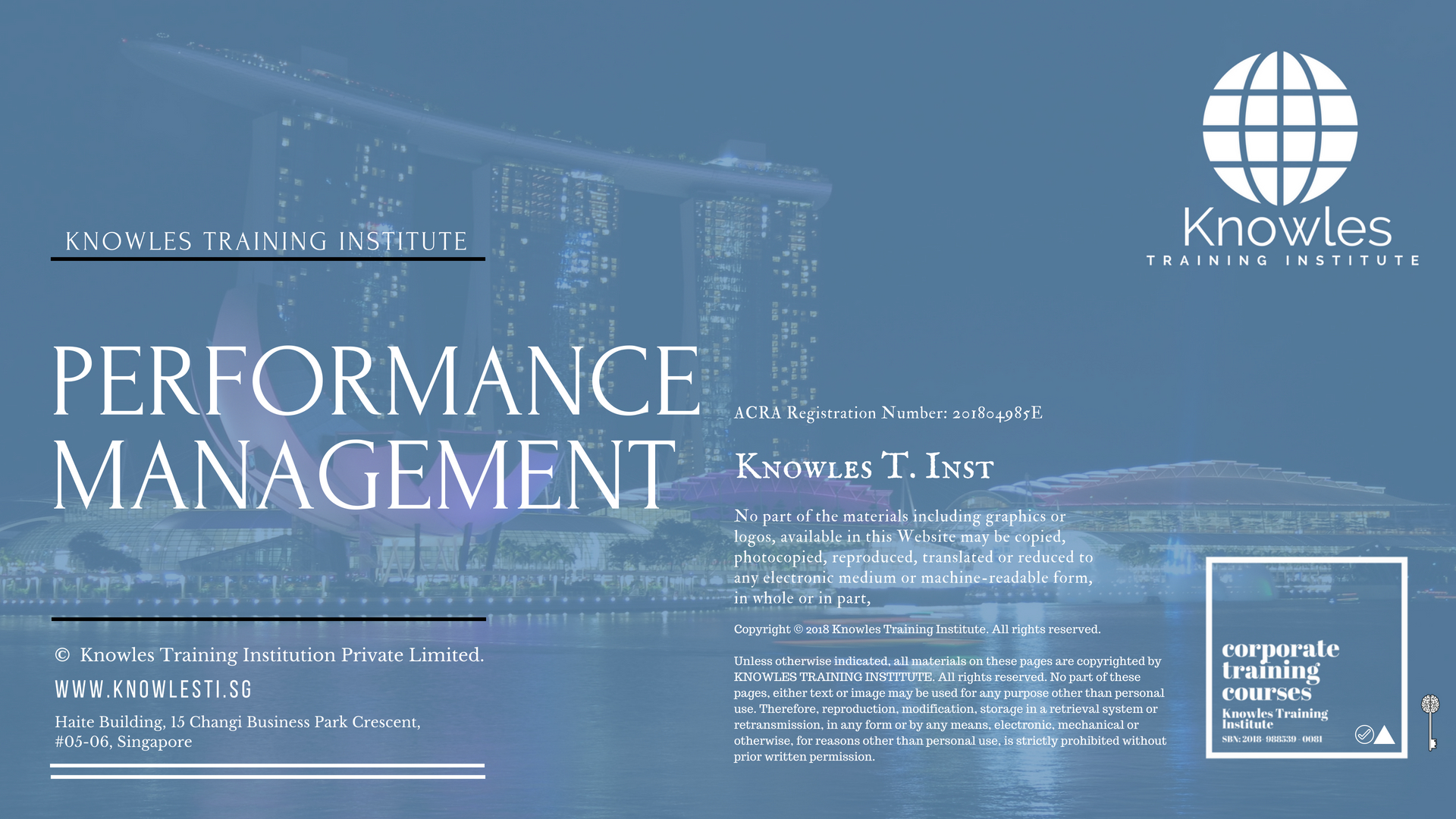
About This Performance Management Training Course
Performance Management Training Course in Singapore
Performance management is a work system that covers a wide area concerning employee work performance such as creating a work-friendly environment, defining clear job descriptions, duties, and responsibilities, and planning training and development programs. This is a major practice that connects the employee to his/her job and the company.
Who Should Attend This Performance Management Training Workshop
This Performance Management workshop is ideal for anyone who would like to gain a strong grasp and improve their Performance Management.
All Staff Within An Organisation
Managers
Team Leaders
Executives
Assistants
Officers
Secretaries
Group Size For This Performance Management Training Program
The ideal group size for this Performance Management course is:
Minimum: 5 Participants
Maximum: 15 Participants
Course Duration For This Performance Management Skills Course
The duration of this Performance Management workshop is 2 full days. Knowles Training Institute will also be able to contextualised this workshop according to different durations; 3 full days, 1 day, half day, 90 minutes and 60 minutes.
2 Full Days
9 a.m to 5 p.m
Performance Management Course Benefits
Below is the list of course benefits of our Performance Management course
- Know the concepts of performance management and its benefits to the company
- Gain the means to promote and improve employees through performance management
- Develop the ways of creating a job-oriented performance management process
- Apply effective methods and strategies of creating tasks that provide feedback to employees
- Learn the ways to get the acquire the needed legal documents for performance management
- Understand the benefits of having a department solely tasked to check and assess employee’s performance
- Be prepared to have the ways to assess quality assurance department and its effectivity in coaching employees
- Be flexible and apply effective coaching strategies regardless of the circumstance
- Master simple methods of coaching and the strategies that can be used on employees
- Be ready to give guidance and direction through specified tasks and activities
- Use positive feedback through proven techniques and principles
- Have the ability to create a performance assessment form
Performance Management Course Objectives
Below is the list of course objectives of our Performance Management course
- Acquire the knowledge of the policies involved in a Performance Appraisals Procedure
- Be able to create performance appraisals procedure and objectives
- Gain the capability to do the steps to Appraise employee performances
- Be ready to create managers who can communicate effectively to inform management about their employees growth
- Know how to interview for performance appraisals
- Know how to identify and effective Performance Requirements for employees to reach for
- Grasp the ways how different managers can add their feedbacks in the appraisal process
- Use performance appraisals with the right frequency and timing
- Apply the techniques to encourage employees for transparency and visibility
- Show expert knowledge on effective monitoring of employees for appraisals
- Create an effective presentation on how performances is reviewed and its rewards
- Use upward appraisals in an effective manner for the benefit of the team
Course Content For This Performance Management Training Course
Below is the list of course content of our Performance Management training course
- What is Performance Management?
- The phrase “Performance Management” was invented in the 1970s by Dr Aubrey Daniels, a clinical psychologist. At the period, he used it to describe technology and the essence of managing behaviour and the result of the action.
- How does Performance Management Work?
- The urge to implement a performance management system is not enough. Management as well as employees must put forth the effort necessary to make it happen. With “all hands on deck” and the observation of the following, organizations can build a successful program.
- Tools
- It is unrealistic to anticipate employees to operate at an optimal level without providing them with the tools to succeed. The following tools are crucial to the accomplishment of the system.
- Three Phase Process
- Kurt Lewin, also known as the “founder of social psychology”, introduced a three-phase theory of change that goes hand-in-hand with performance management. The process includes Three Phases.
- Assessments
- There are a variety of evaluations that can be used to determine skill, knowledge, and ability. These assessments can be applied when the individual is a prospective employee or an actual employee.
- Performance Reviews
- According to Entrepreneur.com, a performance review is defined as “A summary of an employee’s work habits undertaken at a established point in time to determine the degree to which stated goals and expectations had been reached.”
- SMART Goal Setting
- People often fail to reach their goals. This usually indicates that the wrong targets are being chosen. SMART goals will increase the chances of achieving both individual and business goals.
- Specific Goals
- Goals need to be explicit. Employees need to understand exactly what they are expected to do. It is not enough to simply ask for improvement. This is a general goal.
- Measurable Goals
- Aims need to be measurable to be effective. They specify how much or how many. Measurable goals allow employees to identify when they have accomplished their goals.
- Attainable Goals
- Goals must always be attainable. Employees need goals that stimulate them but must still be within grasp. When goals are perceived as unattainable, employees will give up on them without even attempting. The measure of a aim should always be within the limit.
- Realistic Goals
- Employees need realistic goals. It is essential that employees can achieve their goals. The goals need to relate directly to employee abilities, and it is crucial to make sure that they have the tools necessary to meet them.
- Timely Goals
- Goals should always have a time frame. General purposes do not set a time frame. Time frames inspire employees to move onward.
- Monitoring Results
- Once goals are established, it is crucial to monitor their results. This will conclude how effective a plan or strategy is. Use a basic evaluation to determine what modifications need to be made in a project and reevaluate your goals.
- Strategic Planning
- A strategic plan concludes where employees are, where they want to be, and how they will get there. It should encompass the values of the organisation and align with the following company information. The organisation must formulate a strategic plan before creating performance goals.
- Job Analysis
- A job analysis concludes what is required to do a specific job. It will help determine which skills and attributes an employee needs to accomplish a task successfully. A job analysis will help determine who to hire, how to train, and what compensation a job should receive.
- Setting Goals
- Performance goals need to be SMART goals. They need to discuss behaviour, competency, and results. Remember to involve employees in their performance goals.
- Motivation
- Performance is linked to motivation. Motivation is the job of every leader. There is not a single formula for motivating employees.
- What is 360 Degree Feedback
- 360 degree feedback is an alternative method of evaluating employees. Rather than a traditional review, employees are given anonymous feedback from supervisors and peers. Managers’ feedback also includes direct reports and reviews from employees.
- Vs. Traditional Performance Reviews
- 360 degree feedback presents a better picture of performance than traditional reviews. Supervisors perform traditional performance reviews. A traditional review can have a negative impact on performance if employees consider it is not fair.
- The Components
- 360 degree feedback evaluation forms are typically done on a scale of 1 to 10. There is a place for remarks on the evaluation form. The scores from supervisors, peers, employees, and direct reports are averaged and compared with average company scores.
- Competency Assessnent Defined
- Competencies are a set of skills and essential knowledge that are necessary to perform a job well. The competencies for every position should be defined before hiring. They are significant to the hiring and guide the interview process.
- Implementation
- There are several measures that you need to take before you implement competency assessments. Successful implementation requires you to complete all of the steps.
- Final Destination
- The final destination will present a pool of trained professionals with a strong performance. Each company will have its final destination that depends on the goals and needs. Reaching the stage of final destination may indicate completely overhauling the competency program.
- Experience
- Kolb explains the value of concrete experience. Concrete experience is a firsthand experience that affects the senses. It is not merely knowledge about a subject.
- Observation
- Kolb interprets observation as a reflective observation. It is what the concrete experience signifies to the person learning. Watching is the way that information is modified into meaning for an individual. This is where the connotations are formed as learners see diverse perspectives.
- Conceptualisation
- Abstract conceptualisation is a way to gather information on a subject without direct experience. This entails a basic understanding of a situation by implementing logic. An example of this would be studying a training manual.
- Experimentation
- Active experimentation is the final part of Kolb’s Learning Cycle. Here, people learn by doing. They reconstruct knowledge by acting on it.
- Key Factors
- Motivation is more than being content. Motivation is what prompts employees to go the extra mile and invest in a project or company. Fredrick Herzberg identified the key factors that inspire motivation in employees across different fields.
- The Motivation Organisation
- People perform better when they believe in their company. When the values of an organization match the personal values of employees, an organisation will be highly motivated. This is why socially responsible companies are able to efficiently attract talent.
- Identifying Personal Motivators
- Each person has a diverse set of motivators. Some people respond better to verbal praise and others need rewards. It is essential to motivate employees on a personal level.
- Evaluating and Adapting
- Like everything else, it is necessary to evaluate and adapt motivation techniques. Adapt motivation techniques as necessary to improve performance and engage employees.
- Record Goals and Accomplishments
- It is necessary to record your goals and accomplishments. Even minor achievements need to go in the performance journal. Seeing your accomplishments will encourage you, and seeing your goals will urge you to continue striving towards them.
- Linking with your Employees or Managers
- It is vital that employees and managers connect for performance management to be effective. Relationships on every level must remain professional. When employees and managers do not trust each other, performance suffers.
- Implementing a Performance Coach
- A performance coach will assist people to meet their requirements to improve performance. In most organisations, managers act as performance coaches. How well managers coach performance affects the quality of employee performance. Managers must interact effectively with each employee and motivate that person to excel.
- Keeping Track
- Coaches need to keep a record of employee progress. This will encourage them to create strategies that will challenge employees and help them improve. There are various ways to keep track of performance.
- Goals
- Establish professional goals that reflect the demands of the organisation and individual. Make sure that employees have the tools to attain these goals and implement them if they do not. This will enhance productivity and performance.
- Desired Results
- The outcomes of a performance plan are not strategies. They are what employees are expected to achieve, and this should be made clear in the performance plan. Employees are responsible for obtaining the desired results.
- Priortisation
- It is essential to prioritise goals. Employees should concentrate on the top three goals. The targets given priority need to align with the company goals and the top competencies of each position.
- Measure
- Performance must be measured. This is not always simple because some tasks may be subjective. There must be fair standards and measurement established for each position.
- Evaluation
- Compare the measurements against performance to appraise employees. It is also necessary to include whether or not employees accomplished their goals and met desired expectations. This information is generally incorporated in an employee evaluation form.
Performance Management Value Added Materials
Each participant will receive the following materials for the Performance Management course
Performance Management Learner’s Guide
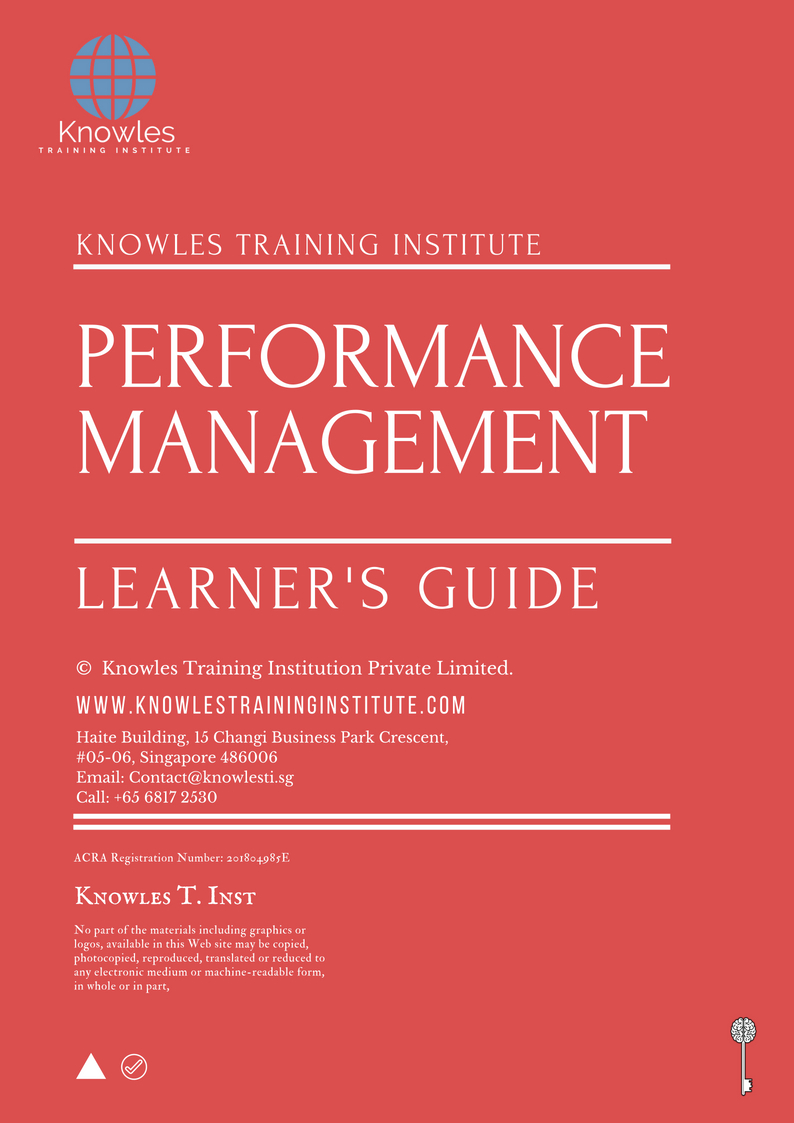
Performance Management Key Takeaways Notes
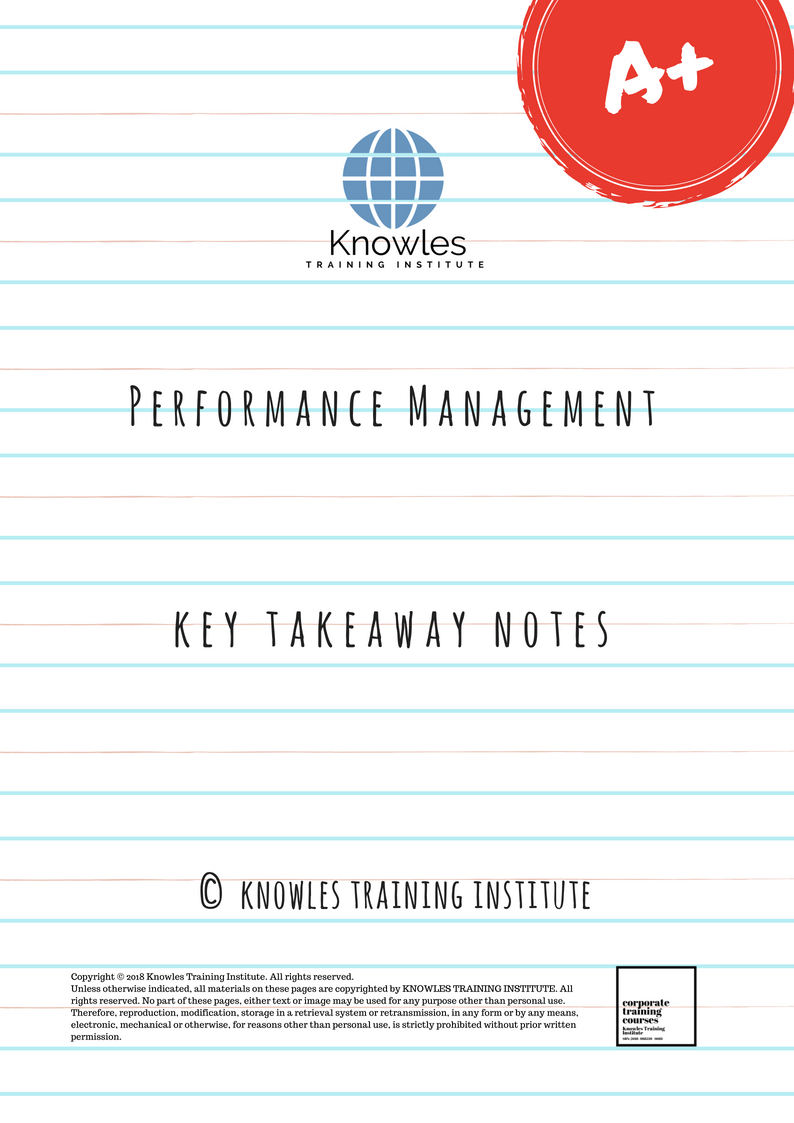
Performance Management Essentials Ebook
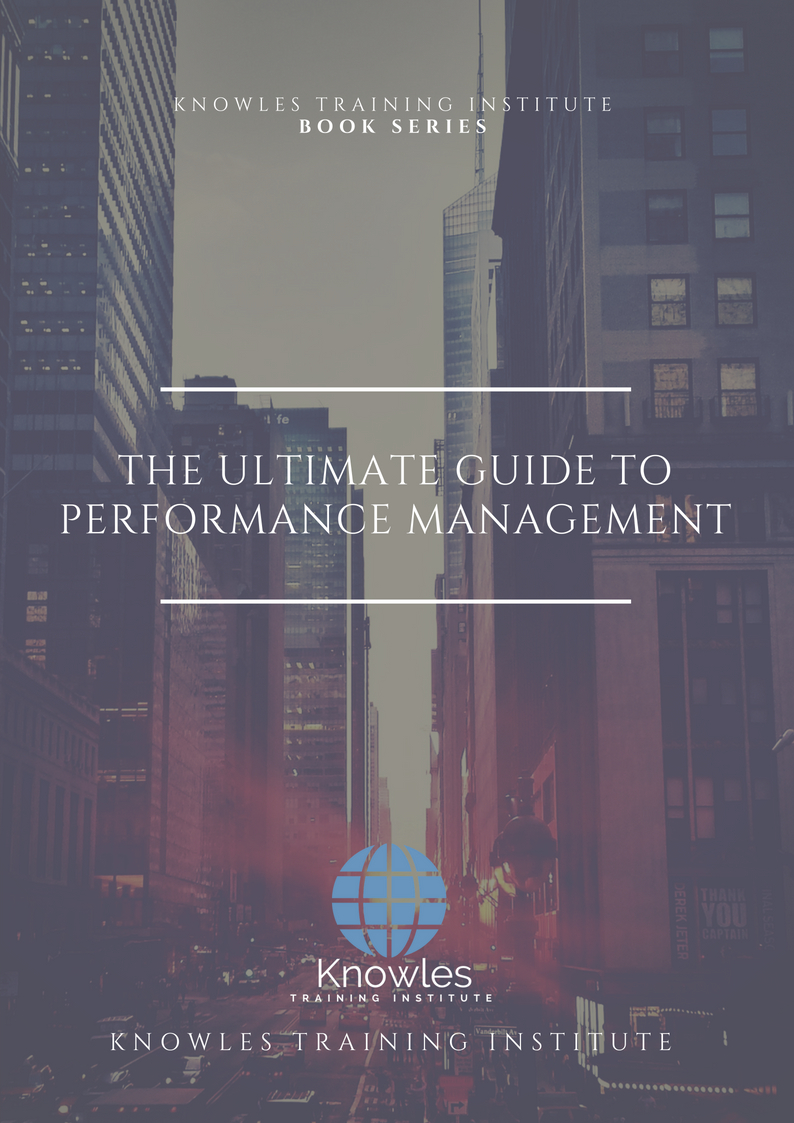
Performance Management Course Handouts
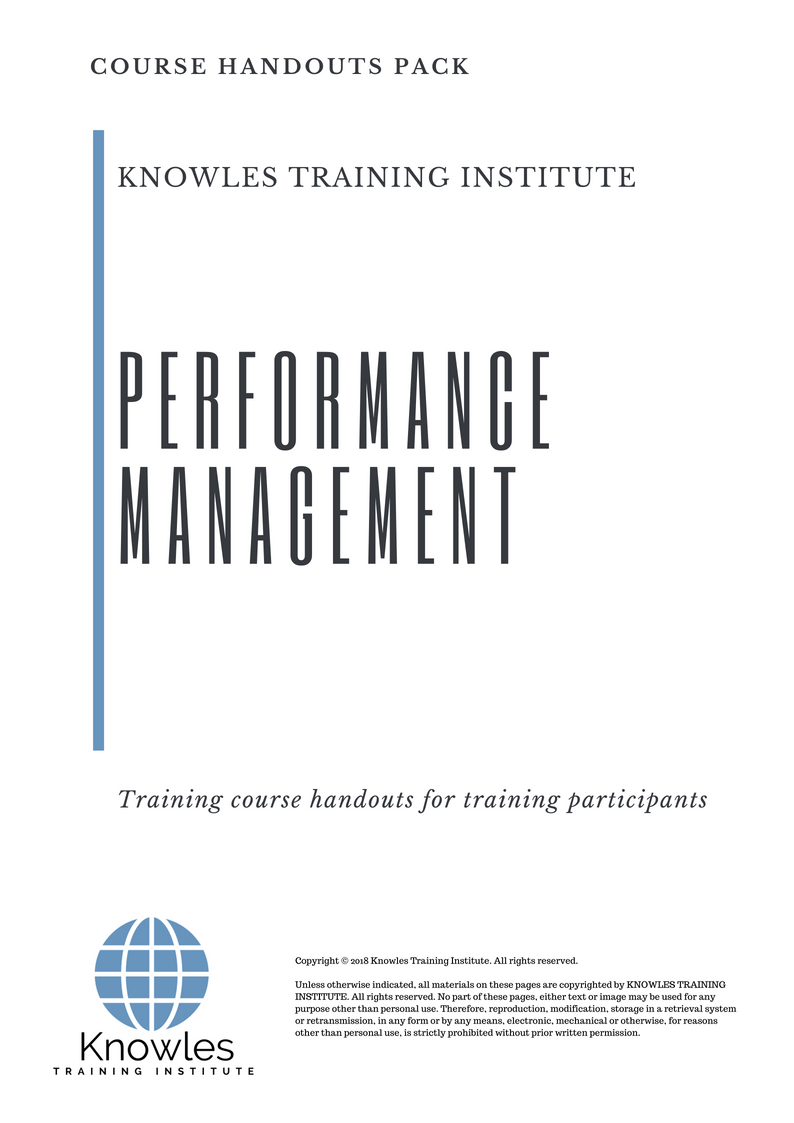
Performance Management 30-Day Action Plan
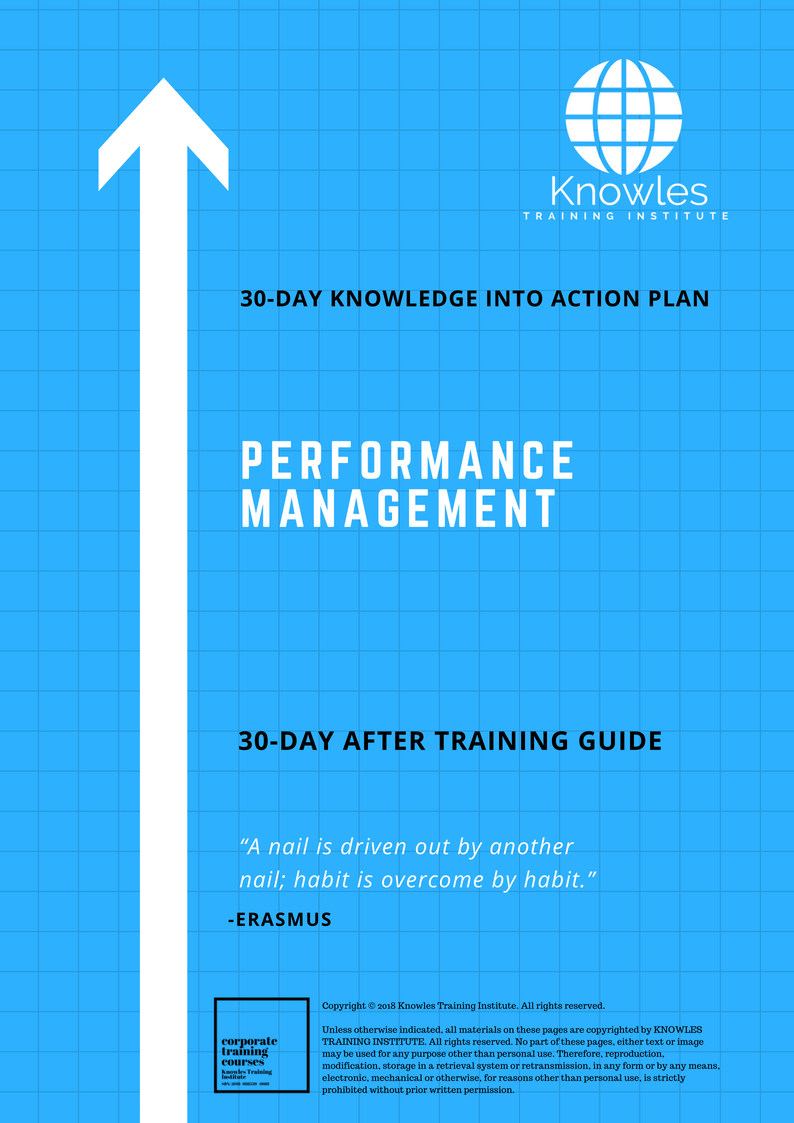
Performance Management MindMaps Pack
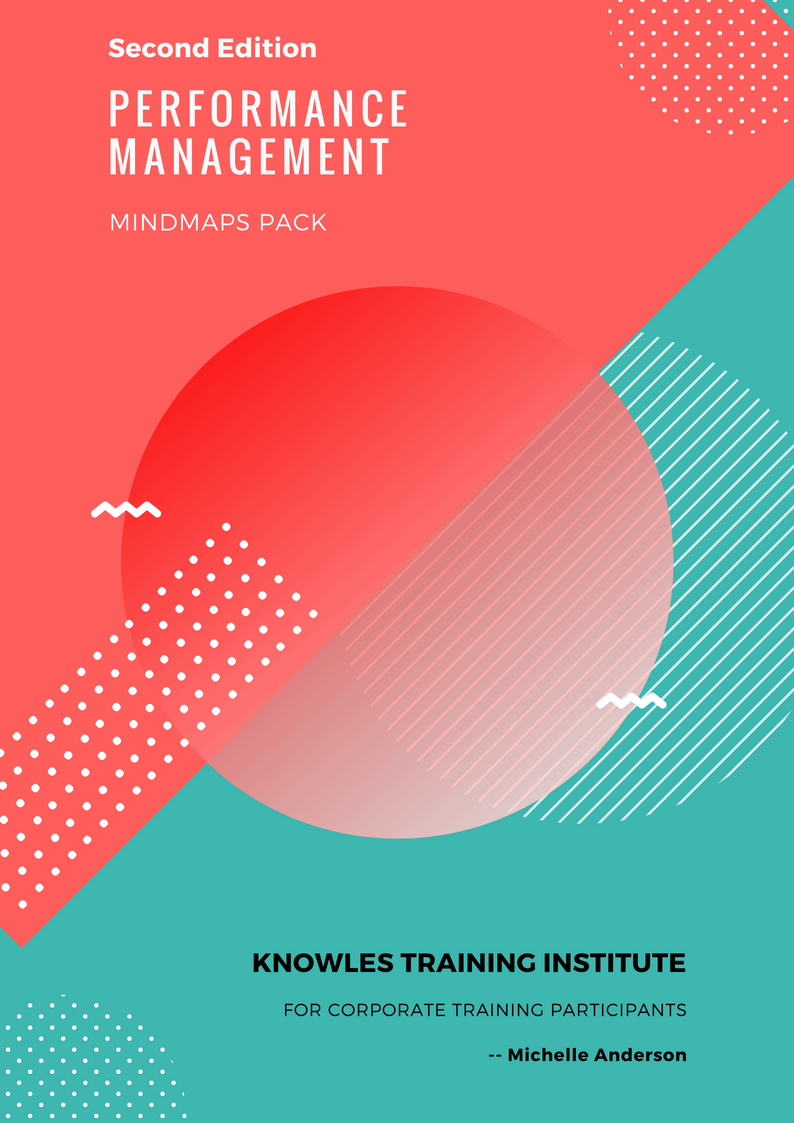
Performance Management PPT Slides Used During Course
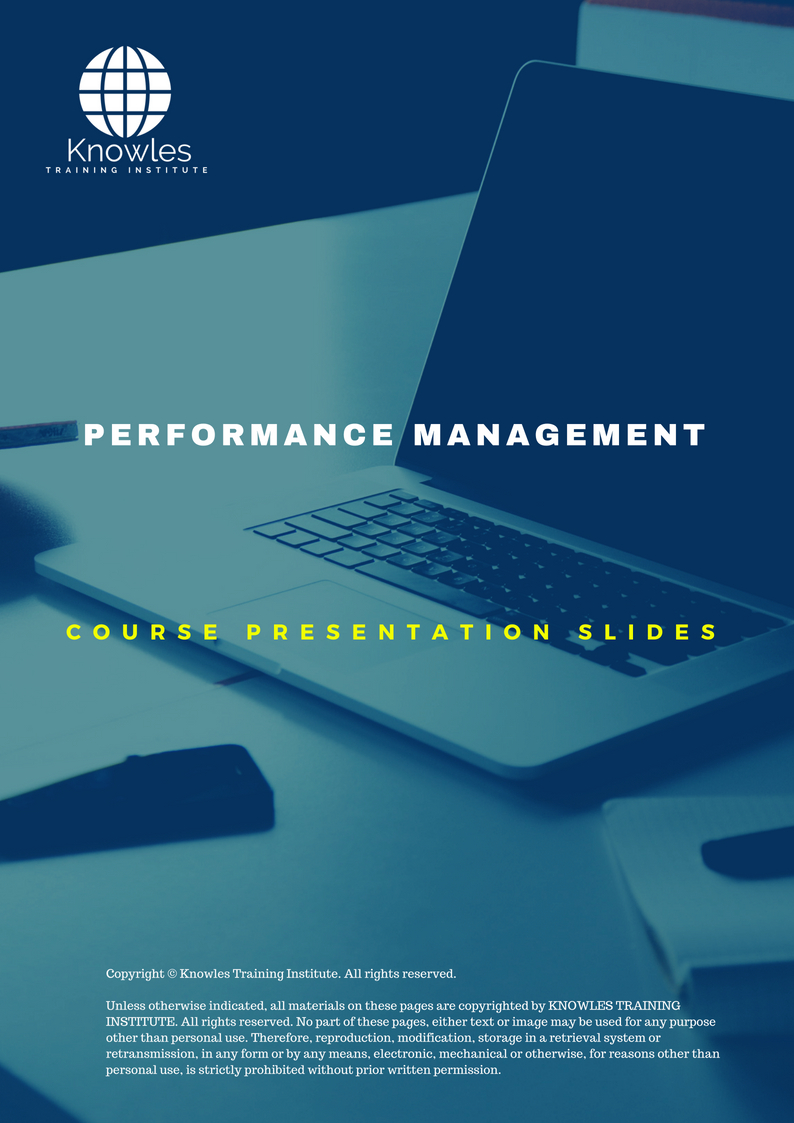
Performance Management Long-Term Memory Flashcards Pack
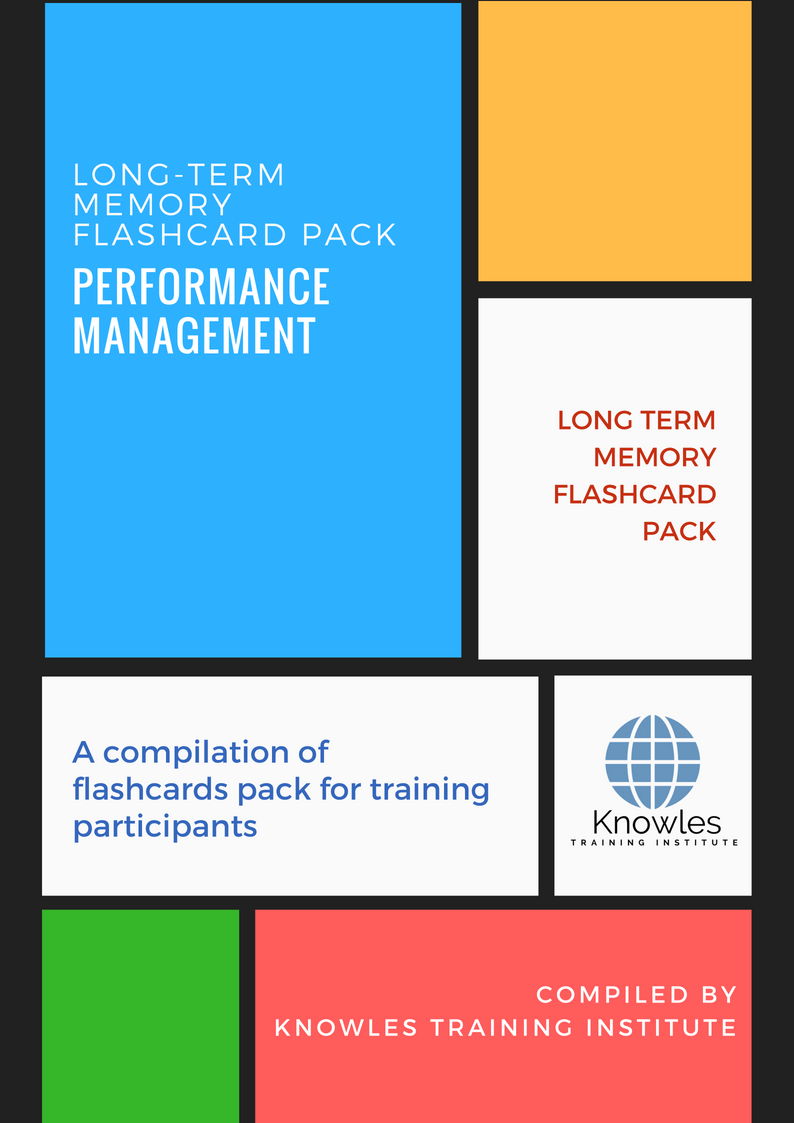
Performance Management E-Learning Course
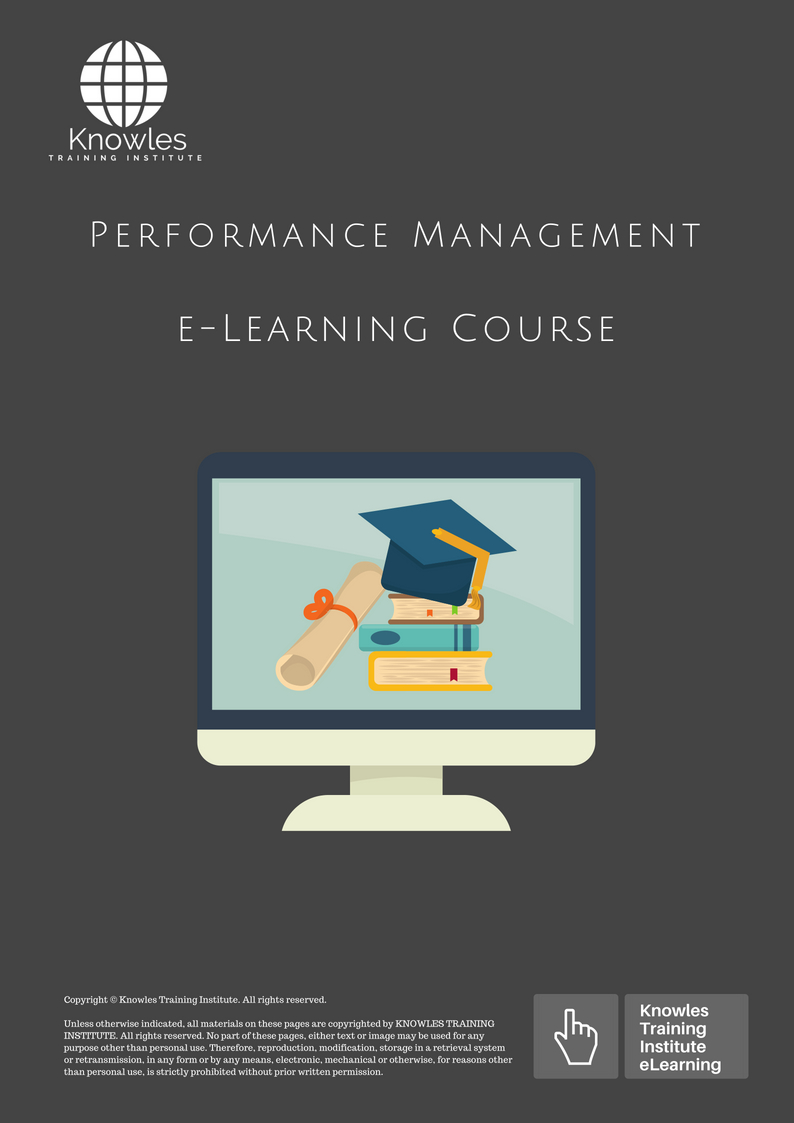
Performance Management Online Video Course
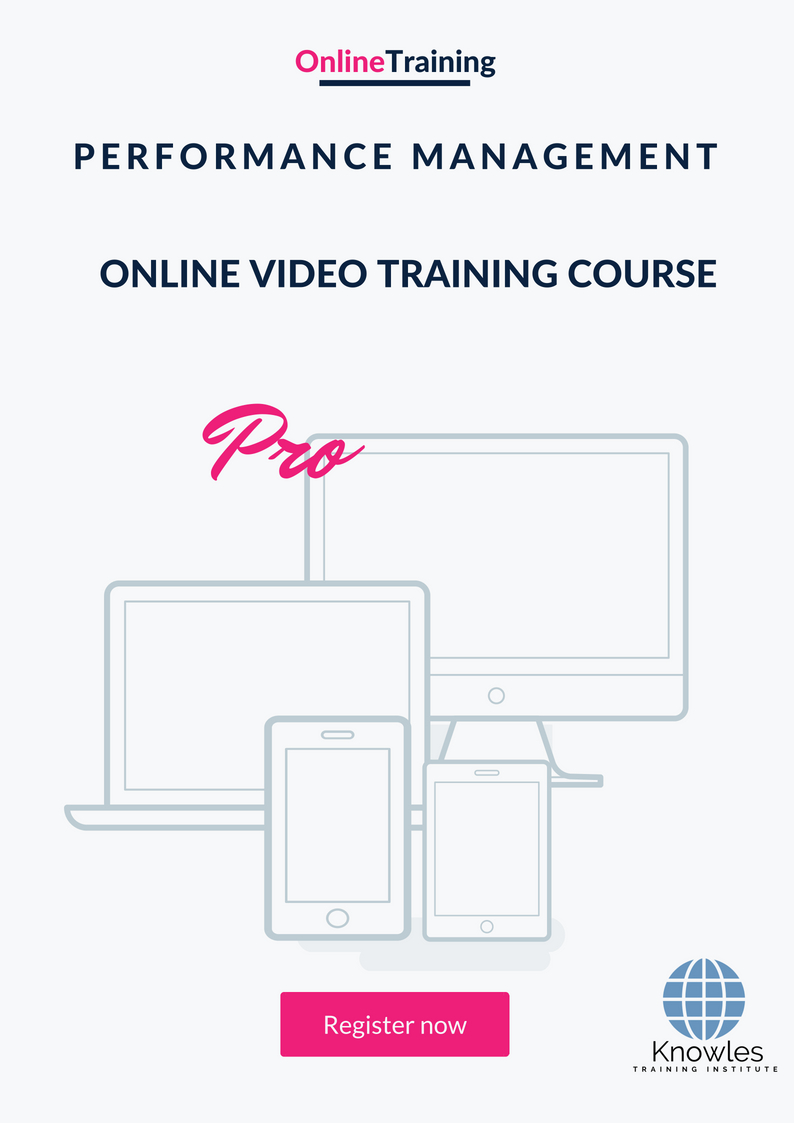
Performance Management Essentials Audiobook
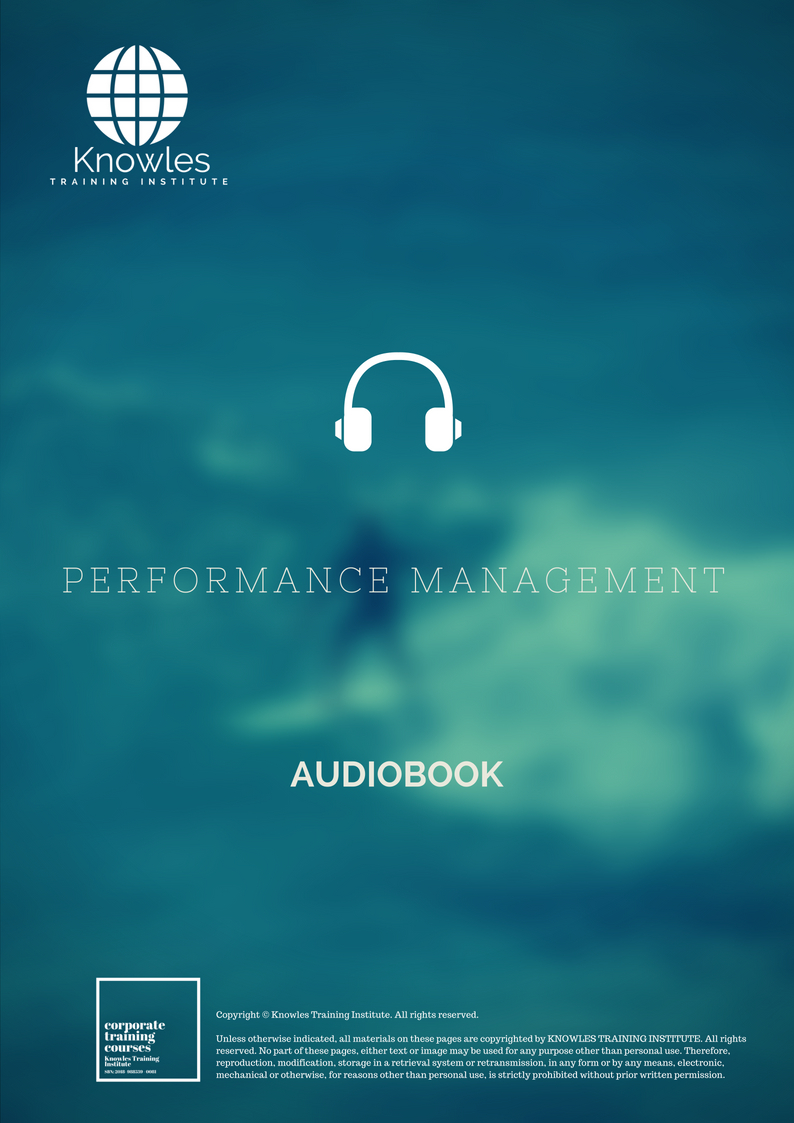
Performance Management Infographics Pack
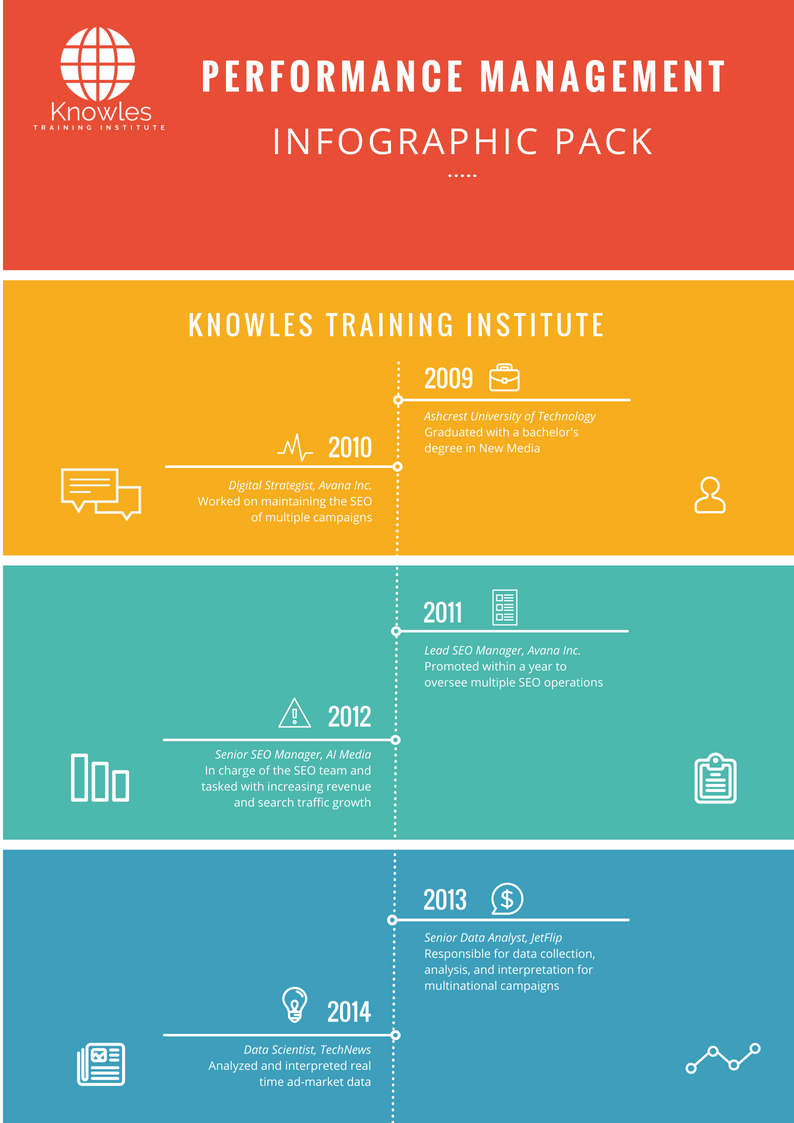
Performance Management Certification
Each course participant will receive a certification of training completion
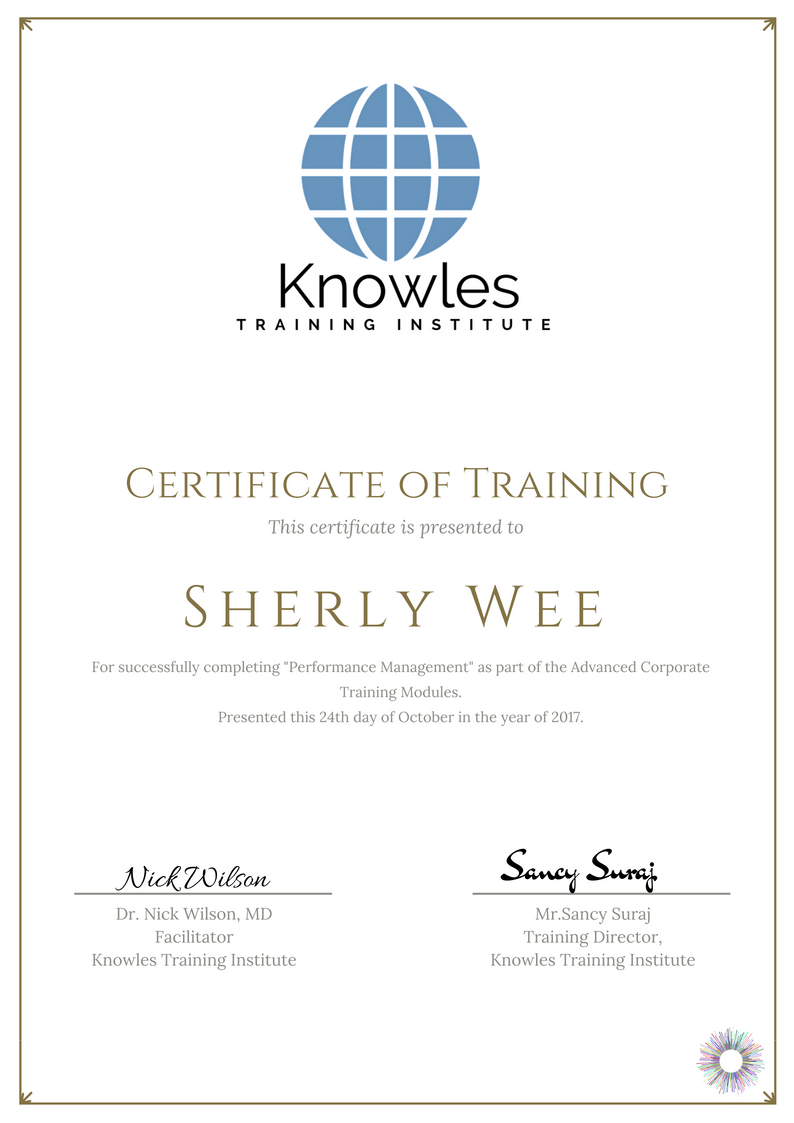
Course Fees
There are 3 pricing options available for this Performance Management training course. Course participants not in Singapore may choose to sign up for our online Performance Management training course.
SGD 1,334.96 For a 60-minute Lunch Talk Session.
SGD 584.96 For Half Day Course Per Participant.
SGD 884.96 For 1 Day Course Per Participant.
SGD 1,184.96 For 2 Day Course Per Participant.
Discounts available for more than 2 participants.
Upcoming Performance Management Training Course Schedule
Contact us for the latest Performance Management course schedules:
Phone: +65 6714 6663
Email: contact@knowlesti.com
Message:
Download Performance Management Course Brochure
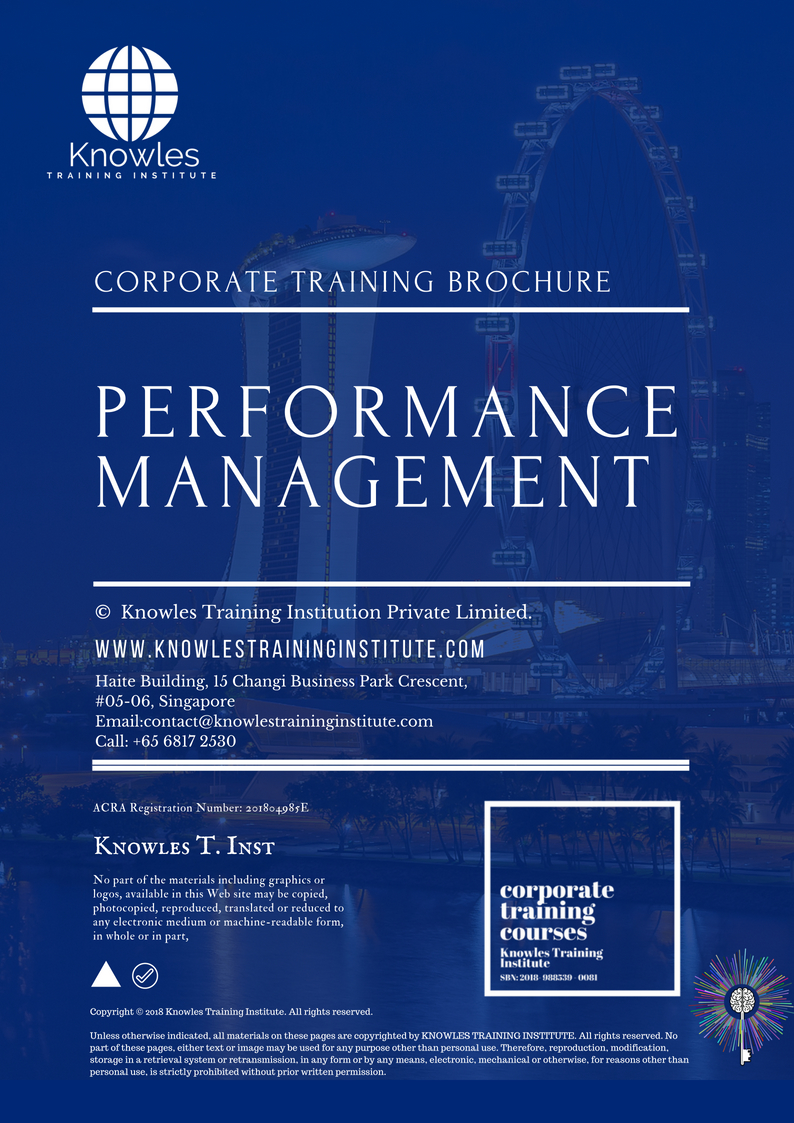
Request for this Performance Management course brochure. Fill up the short information below and we will send it to you right away!
Post-Training Support: A vast majority of training does not have any effect beyond 120 days. But to work, training has to have a strong pre- and post-training component. Post-training reinforcement consequently helps individuals to recall the understanding and ask questions.
Blended Learning: Learning does not occur in the classroom. Virtually everybody prefers distinct ways of learning. Successful learning should have a multi-channel, multi-modal strategy.
We Understand The Industry: Similarly, we’ve got a profound comprehension of the business, business design, challenges, strategy and the that our participants are in and have designed the courseware to cater to their professional needs.
Course Content: Knowles Training Institute’s material is relevant, of high quality and provide specific learning outputs. As a result, Participants will leave the training course feeling as they have gained a strong understanding and will also be in a position to execute what they have learned sensibly.
Course Development — The workshop modules follow a systematic and logical arrangement. Therefore, this structure helps to ensure that the course material allows the facilitators to deliver the course in a logical arrangement. Consider the subjects as building bricks into learning, our facilitators slowly build towards a comprehensive picture of this entire topic.
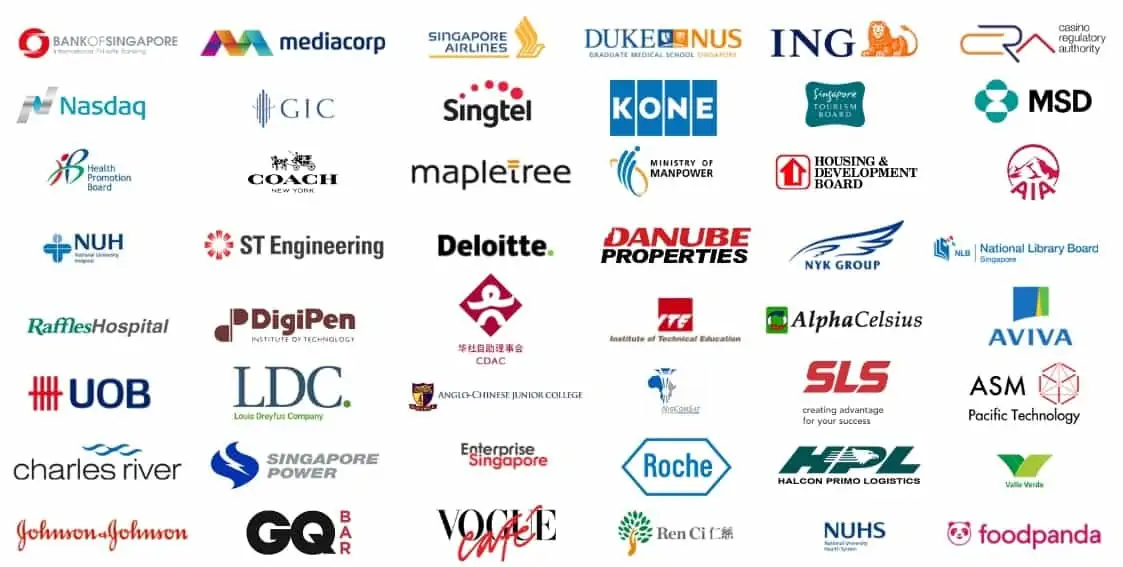

Course Enquiries

Fill up the form and we will get back to you in less than 1 working day.
Alternatively, give us a call to have one of our training consultants contact you. Our corporate training courses can be contextualized to meet your organization’s training needs. Leverage on our large pool of professional trainers and consultants for your organization’s training needs.
Office Address: 60 Paya Lebar Rd, #07-54 Paya Lebar Square, Singapore 409051
Office Phone: +65 6714 6663
Email: contact@knowlesti.sg
We Guarantee 100% Privacy. We Respect Your Privacy. Your Information Will Never Be Shared.


